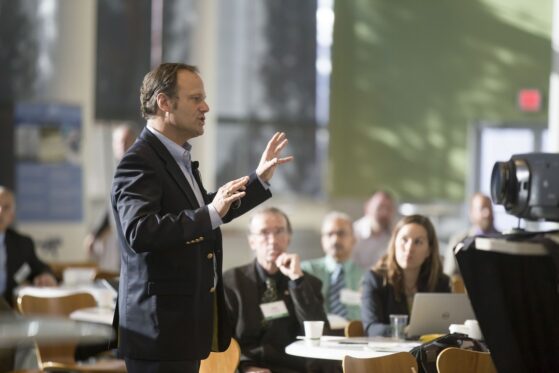The Role of Public Speaking in Leadership and Influence
Leadership, at its essence, is about guiding others toward a shared goal. Yet, a leader’s vision, no matter how brilliant, remains just an idea unless it is communicated effectively. This is where the role of public speaking becomes vital. In this dynamic landscape, public speaking has emerged as one of the most critical tools for leadership and influence. It enables leaders to inspire action, build trust, and shape the future with their words.
In this blog, we delve deeply into why public speaking holds such a pivotal role in leadership, exploring its multifaceted benefits, practical applications, and how it strengthens a leader’s influence in profound ways.

Communication | The Heartbeat of Leadership
Before we dive into the specifics, it’s essential to understand a foundational truth: communication lies at the core of effective leadership. Whether it’s a CEO addressing their organization, a politician galvanizing support, or a community leader rallying volunteers, the ability to communicate ideas with clarity and conviction is what determines a leader’s true impact. Among the many forms of communication, the role of public speaking stands out as particularly vital. It goes beyond written memos, virtual updates, or one-on-one conversations—public speaking creates a powerful space for leaders to connect with many at once, in a way that feels personal, persuasive, and immediate. This unique ability to engage, influence, and inspire through speech makes public speaking not just a skill, but a cornerstone of effective leadership.

Inspiring Vision and Sparking Motivation
One of the most significant roles of public speaking in leadership is inspiration. When leaders stand in front of an audience and speak with conviction, they ignite enthusiasm and hope. The spoken word has an emotional charge that written communication often lacks.
Consider the way leaders weave stories of triumph over adversity or paint vivid pictures of a better future. These narratives appeal not just to logic but to the emotions, sparking motivation that fuels perseverance and innovation.
This emotional connection—established through voice modulation, eye contact, and body language—turns passive listeners into active believers. Therefore, public speaking becomes a vehicle for leaders to breathe life into their visions.

Building Credibility and Trustworthiness
Moving beyond inspiration, public speaking serves as a platform for leaders to establish their credibility. Trust in leadership is fragile and must be nurtured continually.
When leaders communicate openly, clearly, and confidently, audiences perceive them as reliable and competent. Public forums allow leaders to showcase their knowledge, acknowledge challenges transparently, and demonstrate accountability.
Moreover, effective public speakers often build a consistent narrative around their values and actions, reinforcing trust over time. In contrast, ambiguous or hesitant speakers may inadvertently sow seeds of doubt.

Driving Change and Overcoming Resistance
Change is an inevitable and often uncomfortable reality within organizations and communities. Leaders who excel in public speaking can use this platform to manage change proactively.
By clearly explaining the reasons behind change, addressing concerns candidly, and outlining the benefits, leaders reduce uncertainty and resistance. Their ability to frame change positively influences attitudes, making transitions smoother and more widely accepted.
Public speaking also empowers leaders to celebrate milestones and rally continued support, keeping momentum alive even in challenging phases.

Enhancing Influence Through Persuasion
Leadership is inseparable from influence—the ability to sway opinions and guide decisions. Public speaking hones persuasion skills by teaching leaders how to present logical arguments alongside emotional appeals.
Using rhetorical techniques such as repetition, storytelling, and vivid imagery, leaders can craft messages that resonate deeply and linger in the minds of their audience.
Furthermore, public speaking allows leaders to anticipate and respond to counterarguments in real time, strengthening their position and demonstrating thoughtfulness.

Amplifying Leadership Presence and Visibility
In today’s digital and globalized world, visibility often equates to influence. Public speaking engagements elevate a leader’s presence beyond their immediate circles.
Whether delivering keynote addresses, participating in panels, or hosting webinars, leaders gain opportunities to showcase their expertise and values to broader audiences.
This visibility can open doors for collaboration, attract talent, and position leaders as thought leaders in their fields. The ability to speak well publicly thus becomes a career accelerator, not just an organizational asset.

Cultivating Emotional Intelligence and Connection
Effective public speaking is much more than reciting prepared lines; it requires genuine connection with the audience. Leaders who cultivate emotional intelligence understand the moods, concerns, and motivations of their listeners.
This awareness allows them to adjust their tone, pace, and content dynamically, making communication more impactful.
By reading audience reactions—through body language or engagement cues—leaders refine their approach on the fly, enhancing understanding and rapport.

Empowering Conflict Resolution and Crisis Leadership
Every leader will face moments of conflict or crisis. During such times, communication becomes even more critical.
Public speaking skills equip leaders to address these situations head-on with calmness, clarity, and authority. A well-delivered speech or address can reassure stakeholders, clarify misunderstandings, and outline steps for recovery.
Moreover, leaders who communicate openly during crises foster a culture of transparency and resilience, which can preserve organizational stability.

Encouraging Inclusivity and Team Cohesion
Leadership is not just about the individual; it’s about fostering a sense of belonging among diverse teams. Public speaking provides a channel for leaders to promote inclusivity by acknowledging different perspectives and encouraging open dialogue.
When leaders use public speaking to recognize contributions, celebrate diversity, and articulate shared values, they build cohesive teams aligned with common goals.
This inclusivity enhances collaboration and innovation, creating an environment where everyone feels valued.

Overcoming Common Public Speaking Challenges for Leaders
Despite its importance, many leaders struggle with public speaking due to:
Fear of Judgment: Even seasoned leaders may fear criticism or making mistakes publicly.
Complexity of Content: Translating technical or abstract ideas into relatable messages can be daunting.
Time Constraints: Busy leaders often lack the time for thorough preparation and practice.
Authenticity Concerns: Balancing professionalism with authenticity requires skill and self-awareness.
Addressing these challenges requires deliberate effort—through coaching, rehearsal, and continuous learning. Leaders who commit to improving public speaking not only overcome these barriers but also grow more confident and effective overall.

Practical Strategies to Master Public Speaking as a Leader
To harness the full potential of public speaking, leaders can adopt the following practices:
Craft a Clear Message: Define the core idea and purpose before speaking.
Structure Content Logically: Use frameworks like problem-solution or storytelling arcs.
Practice with Feedback: Rehearse in front of trusted colleagues or mentors.
Develop Non-Verbal Skills: Work on gestures, posture, and eye contact to complement words.
Engage the Audience: Use questions, anecdotes, or interactive elements.
Embrace Imperfection: Allow authenticity and vulnerability to connect genuinely.
Adapt to the Audience: Research audience demographics and tailor content accordingly.
Leverage Technology: Use visuals, slides, and microphones effectively to enhance delivery.

Conclusion | Public Speaking—A Leadership Superpower
To conclude, public speaking is far more than a skill—it is a leadership superpower. It empowers leaders to articulate vision, foster trust, navigate change, and leave a lasting impact. The leaders who master this art are not just heard—they are followed.
In an era marked by rapid change and diverse challenges, public speaking bridges the gap between ideas and action, between vision and reality. Investing time and effort in honing public speaking abilities is therefore essential for any leader committed to influence and success.
If you are a leader or aspiring to be one, remember: your voice is your greatest asset. Cultivate it, sharpen it, and use it to inspire transformation wherever you go.
At The Mystic Keys, we believe in empowering voices that lead. If you’re ready to grow your confidence, command attention, and speak with purpose, join our Public Speaking Course Online and take the next step in your leadership journey.








